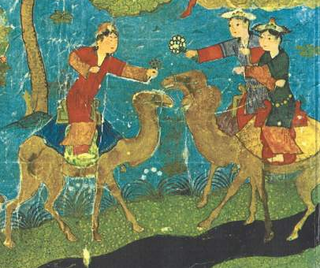
In the Islamic Quran, an Āyah is a "verse", one of the statement of varying length that make up the chapters (surah) of the Quran and are marked by a number. The word means "evidence", "sign" or "miracle", and in Islam may refer to things other than Quranic verses, such as religious obligations or cosmic phenomena. In the Quran it is referred to in several verses such as:
تِلْكَ ءَايَٰتُ ٱللَّهِ نَتْلُوهَا عَلَيْكَ بِٱلْحَقِّۖ فَبِأَىِّ حَدِيثٍۭ بَعْدَ ٱللَّهِ وَءَايَٰتِهِۦ يُؤْمِنُونَ
("These are the Ayat -- proofs, evidences, verses, lessons, revelations, etc. -- of God, which We recite to you, O Muhammad, with truth. Then in which speech after God and His Ayat will they believe?")

The houris are beings in Islamic mythology, described in English translations as "and splendid companions of equal age [or well-matched]", "lovely eyed", of "modest gaze" and virgins who will accompany the faithful in Jannah.

The term aṣ-ṣaḥābah refers to the companions, disciples, scribes and family of the Islamic prophet Muhammad. This form is definite plural; the indefinite singular is masculine sahabi, feminine sahabia.

Sūrat al-Qalam is the sixty-eighth sura of the Qur'an with 52 ayat. The Surat describes Allah's justice and the judgment day. Three important themes of this Surah are response to the opponents objections, warning and admonition to the disbelievers, and exhortation of patience to the Islamic prophet Muhammad. Chronologically, this is the first appearance of any of the "disjointed" [i.e., single] letters (muqattaat) which precede a number of the surahs of the Qur'an while in Quranic Order this is the last surah to have the appearance of (muqattaat).

āl ʿimrān is the third chapter of the Quran with two hundred verses (āyāt). The chapter takes its name from the family of Imran mentioned in verse 33.

al-, also Romanized as el- as pronounced in varieties of Arabic, is the definite article in the Arabic language: a particle (ḥarf) whose function is to render the noun on which it is prefixed definite. For example, the word كتاب kitāb "book" can be made definite by prefixing it with al-, resulting in الكتاب al-kitāb "the book". Consequently, al- is typically translated as the in English.
The Hadith al-Thaqalayn, also known as the Hadith of the two weighty things, refers to a saying (hadith) of the Islamic prophet Muhammad. According to the hadith of Muhammad prophet Qur'an and Ahl al-Bayt had been described as the two weighty things. In the context of this Hadith, Muhammad's family refers to Imam Ali ibn Abi Talib, Fatimah bint Muhammad, and their children and descendants. This hadith is accepted by Shia and Sunni Islam.
Tabarra is a doctrine that refers to the obligation of disassociation with those who oppose God and those who caused harm to and were the enemies of the Islamic prophet Muhammad or his family. As Shi'as believe, Imamate is the inheritor of Risala (apostleship), thus it is the protector of Islam. Muhammad introduced them (Imams). Later every Imam introduced and stipulated the next Imam. So, people who were obstacles to the Imamate and implementation of the true form of Islam and equally the people who were the enemies of Ahl al-Bayt are the enemies of God and it is necessary for all believers to dissociate from them.

The Event of Mubahala was a meeting between the Islamic prophet Muhammad and a Christian delegation from Najran, in the month of Dhu'l-Hijja, 10 AH, where Muhammad invoked a curse attempting to reveal who was lying about their religious differences.

Several hadith indicate the importance as sources of Islam not only the Quran, but also of the Sunnah of the Islamic prophet Muhammad. One of these hadith quotes Muhammad as saying: "I have left among you two matters by holding fast to which, you shall never be misguided: the Book of God and my Sunna."

An-Nisa, 34 is the 34th verse of chapter (surah) #4 of the Quran.
Qur'an 17:26 is the twenty-sixth verse of Al-Isra, the seventeenth chapter of the Qur'an, which relates to the controversies of the land of Fadak in modern-day Saudi Arabia.

Ahl al-Kisa', or the People of the Cloak, are the Islamic prophet, Muhammad; his daughter, Fatimah; his cousin and son-in-law Ali; and his two grandsons Hassan and Husayn.
Shafa'ah, in Islam is the act of pleading to God by an intimate friend of God for forgiveness. Shafa'ah has a close meaning to Tawassul, which is the act of resorting to intimate friends of God to ask forgiveness.

The Verse of Wilayah or Leadership is the 55th verse of the Al-Ma'ida Chapter in the Quran. Both Sunni and Shia scholars accept that the verse alludes to the giving of zakāṫ to the poor by Ali while he was in rukū‘ during Ṣalāṫ, but only the Shia see it as bestowing the succession of Muhammad upon him.

The verse of Mawadda is verse twenty three of sura Ash-Shura that Muhammad's wage of Resalat is introduced to love his near relatives.

The majority of Islamic commentators do not believe that Ali ibn Abu Talib is mentioned explicitly in the Quran. However, Shi'ite scholars and some Sunni scholars interpret many Quranic verses as referring to Ali. Shi'ite scholars also believe other Imams have been referred in the Quran. They believe Imams are referred to as "the signs of Allah, the way, the straight path, the light of Allah, the inheritors of the Book, the people of knowledge, the holders of authority and other such designations," Shi'ite sources state, Muhammad al-Baqir answers: "Allah revealed Salat to his Prophet but never said of three or four Rakats, revealed Zakat but did not mention to its details, revealed Hajj but did not count its Tawaf and the Prophet interpreted their details. Allah revealed this verse and Prophet said this verse is about Ali, Hasan, Husayn and the other Twelve Imams." Shi'ite scholars, thus, have argued that a quarter of Qur'anic verses are stating the station of imams. Such a view is rejected by Sunni scholars, who argue that some of these verses instead refer to the Quraysh or Muhammad's wives.
















